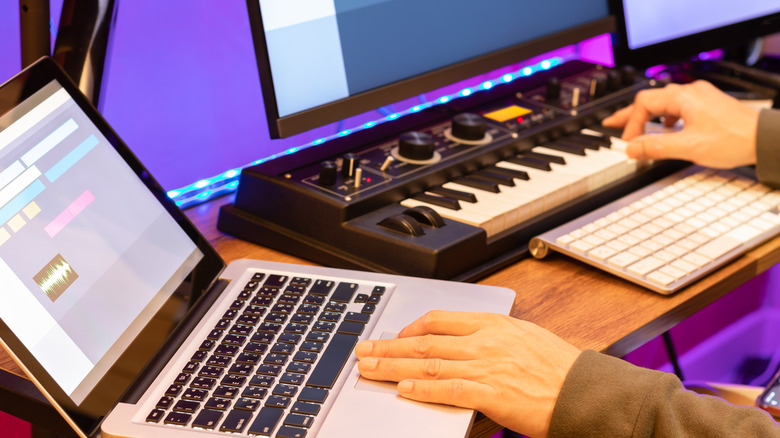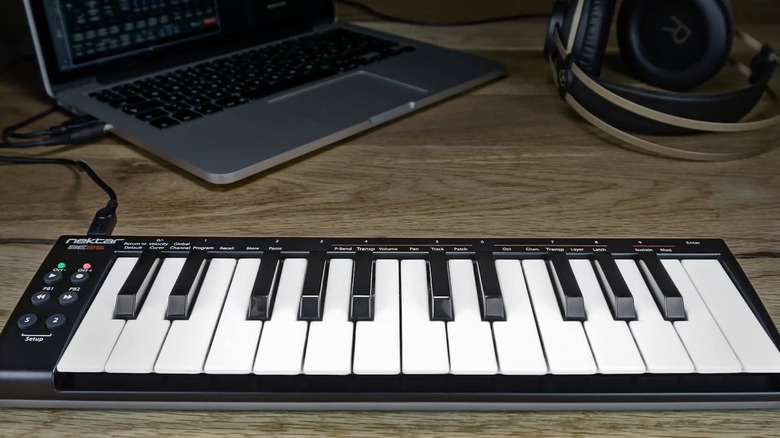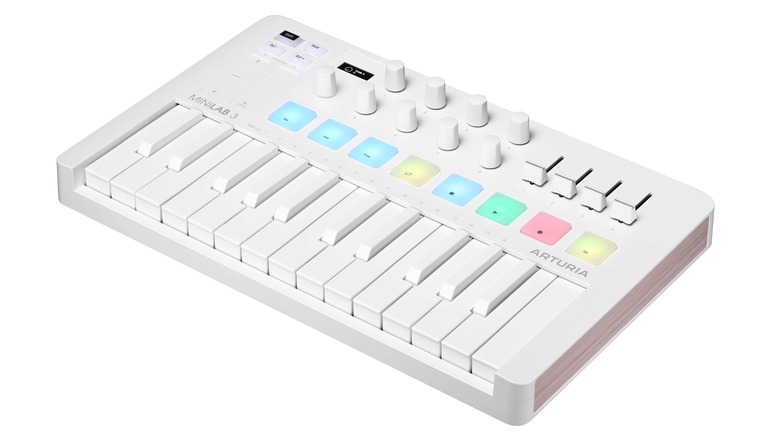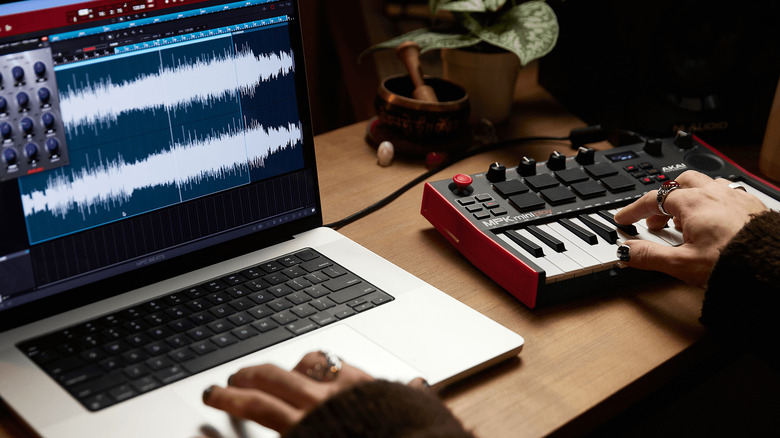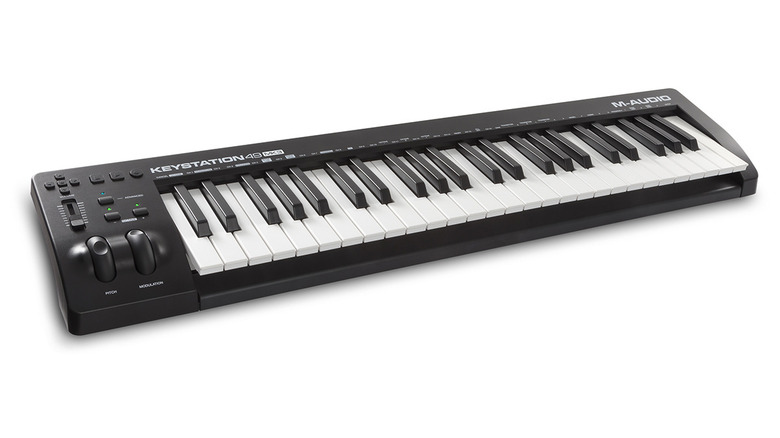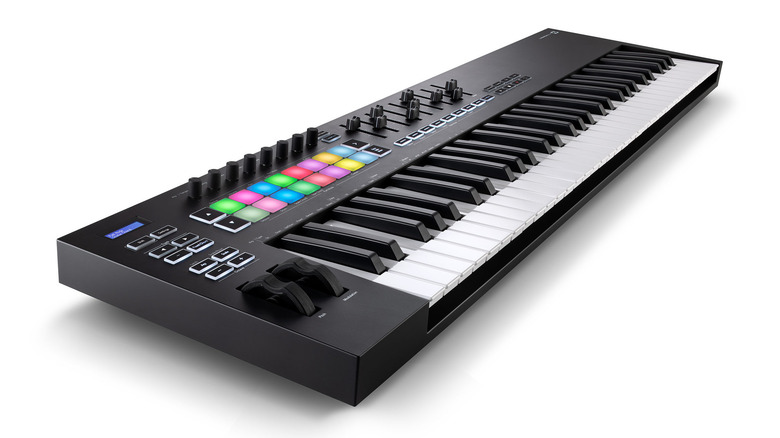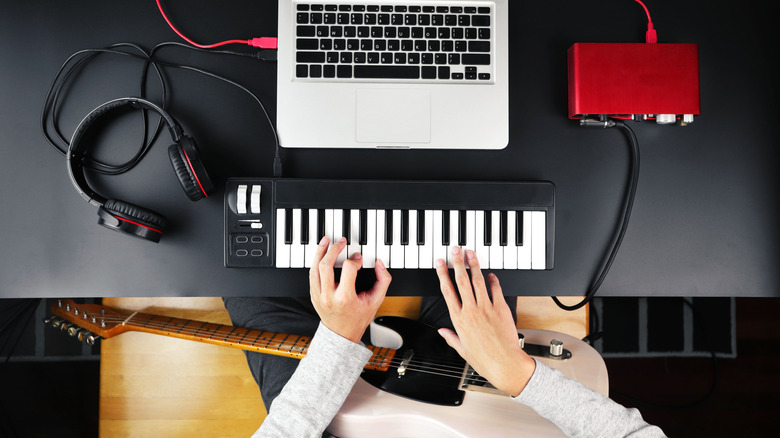5 Of The Best MIDI Controllers For Beginners
It's rare nowadays to find a recording setup that doesn't use a digital workflow. A good digital setup simplifies music composition, engineering, and production, letting an artist create whole tracks in their bedroom that could have come from a studio. This is partly due to free and low-cost digital audio workstations (DAW), but tons of other devices also help music go digital. Most importantly, there's MIDI.
MIDI — Musical Instrument Digital Interface — goes back to the 1980s. By itself, MIDI is just a communications protocol, code allowing instruments to talk to each other and send input to computers. MIDI controllers are input devices allowing the player to control an electronic instrument either in the form of an external sound generator like a synthesizer or music software on a computer. They usually look like keyboards, but they're as different from each other as keyboards and pianos are. MIDI controllers don't make any sound themselves; they just operate other instruments. If you've heard a string or horn arrangement in a pop song sometime in the last decade, those parts probably came from virtual instruments played with MIDI controllers.
If you're looking to get into digital music production, you need a MIDI controller in your arsenal. Here are five controllers to get you started composing.
Nektar SE25
Let's start with the barest of bare-bones options for your digital setup. The Nektar SE25 is a great, inexpensive, entry-level MIDI controller and arguably the best budget controller out there. Available at just $49.99, this 25-key controller may not be extravagant, but it will teach you the basics and allow you to upgrade in the future.
The features of the SE25 are minimal but essential. The buttons along the side of the keys allow you to jump octaves in your playing, as well as be able to play harmony parts over what you have previously played. While this MIDI controller is compatible with DAWs like the upscale Logic, it can also be used with a program like GarageBand, which is a great basic audio workstation to learn on. Other keyboards within this price range tend not to be compatible with DAWs, so getting that for this cheap is wonderful. If you're curious about digital music production, the Nektar SE25 is a great way to try it without breaking the bank.
Arturia Minilab 3
If you are serious about digital music production and want a more complete experience with your MIDI controller, there are still a number of small and relatively inexpensive options, and few controllers get higher marks — particularly for reliability — than the Arturia Minilab 3. Like the Nektar, this is also a 25-key controller but comes with a much more generous set of features.
When you purchase a Minilab 3 through Arturia, you get more than the controller. The Minilab 3 comes with six different pieces of software, including several virtual instruments comprising thousands of sounds. It also includes the most basic version of Ableton Live, which, alongside Logic Pro, is one of the dominant digital production tools in the music industry. The base price for the Minilab 3 is $109, but if you want to get a little more stylish, Arturia also offers a sleek Alpine White color variant for $149.
Akai Mini Play MK3
On its face, the Akai Mini Play MK3 is not all that different from the aforementioned Arturia Minilab 3. Both MIDI controllers feature 25-key keyboards, pads, knobs for controlling sounds, and buttons for further features, such as octave shifting and preset sounds. Why does Akai's MIDI controller retail for $129 when the Minilab comes in at $109? Well, it mainly centers on the actual hardware of this MIDI keyboard.
Rather than the difference being how it manipulates sound through your DAW, the Akai differs from the Arturia in what features are built into the actual controller. In a rarity for a MIDI controller, the Akai Mini Play MK3 has an onboard speaker, allowing you to hear what you're playing with no computer required. It also comes with keyboard and drum sound options and an OLED display for visual feedback of what you are playing. So, if you find yourself composing away from your computer, this makes for a great option.
M-Audio Keystation 49 MK3
These next two MIDI controllers are for people who may not be familiar with digital music production but have experience playing a piano or keyboard. For some musicians, having 25 keys simply isn't enough for their skills, even if they don't have the room for a full 88-key controller in their workspace. A great option that splits the difference is the M-Audio Keystation 49 MK3, which, as the name implies, features a 49-key keyboard. It's a top choice among intermediate-price MIDI keyboards.
Among the 25-key controllers, the Keystation 49 most closely resembles the Nektar SE25 in its range of features. This is a bare-bones controller, delivering pitch wheels and a fader but no sequencer, pads, or onboard speaker. It does come with a suite of software options, including Ableton Live Lite. What it lacks in features, it makes up for in price because this 49-key controller only goes for $129, an excellent value for a tool of its size and complexity.
Novation Launchkey 61 MK3
Being a beginner, you may think that you have to start with one of these small MIDI controllers in order to learn the ropes. While that works for some people, others who expect to get deeply into digital music production may want to jump into the deep end with a large, high-quality controller like the Novation Launchkey 61 MK3.
The Launchkey 61 is a MIDI controller that comes with all the bells and whistles. It includes 16 pads, faders, and that 61-key keyboard, opening new production possibilities and giving players nearly the full range of a traditional set of keys. The Novation Launchkey works incredibly well whether you are using Ableton Live (the Lite version does come with the controller's software package), Pro Tools, Logic, or just about any other DAW you want to use. It can also be used on its own, away from a computer.
This MIDI controller comes at a higher price of $279.99, but if you know that this is something you are in for the long haul, you might save money with this initial purchase rather than continuously upgrading. Think about your space, the music you want to create, and your budget; any of these options could be right for you.
How we chose these MIDI controllers
These five MIDI controllers are only some of the many terrific controllers available for those first getting into using DAWs for music creation. As for why these five were selected, that comes down to pulling together reviews and recommendations from publications that specialize in covering instruments and music production, like MusicRadar, American Songwriter, Digital DJ Gear, Headliner, Gear4Music, Stozz Audio, and Groover.
These five were chosen to give a broad view of the different available styles, sizes, and prices of MIDI controllers on the market, which means they are not necessarily the five greatest MIDI controllers of all time. Different musicians have different needs, which is why there is a wide spread of options. Outside of these five controllers, there are still many other wonderful options to choose from, but the five here serve as a baseline or jumping-off point for diving into your music creation journey.
